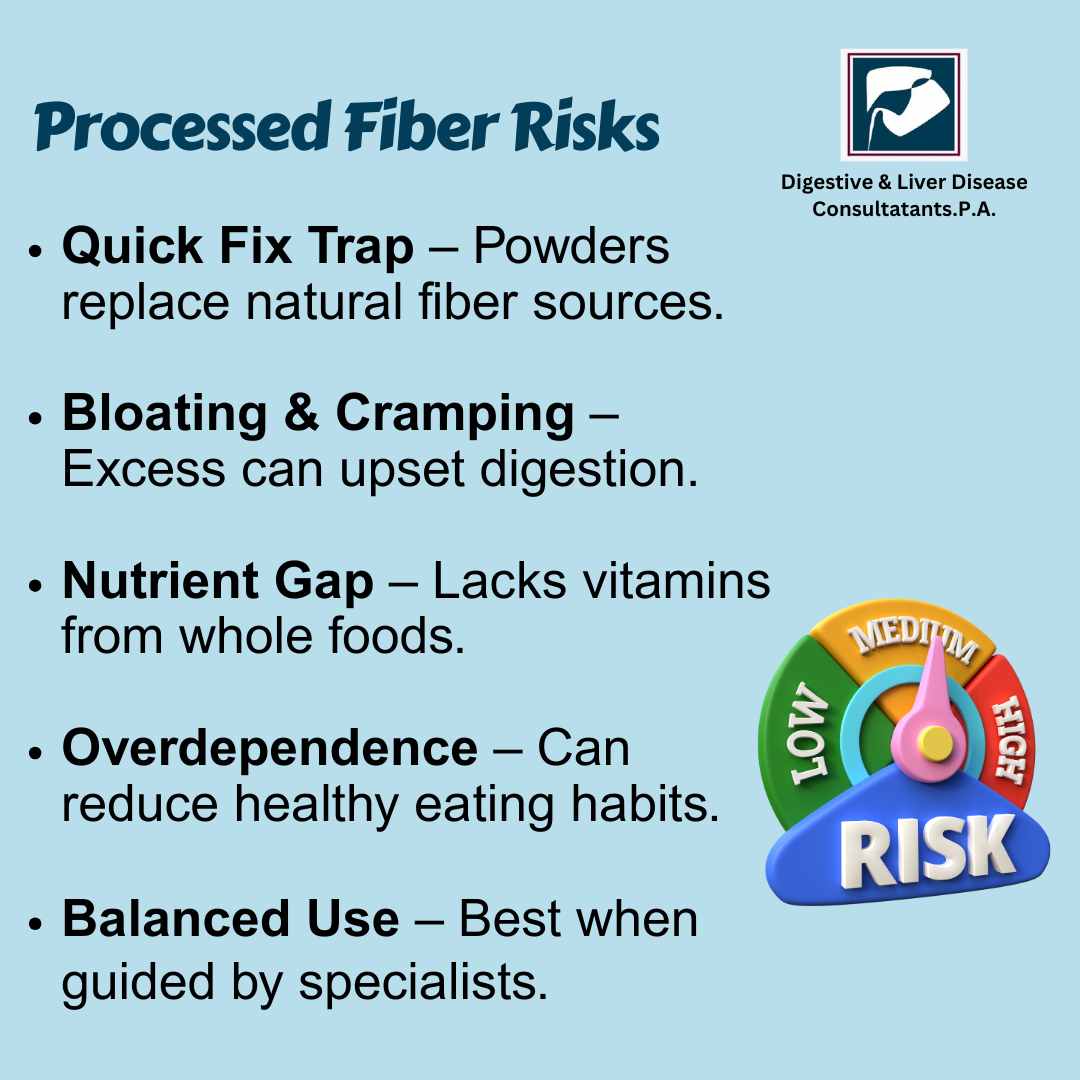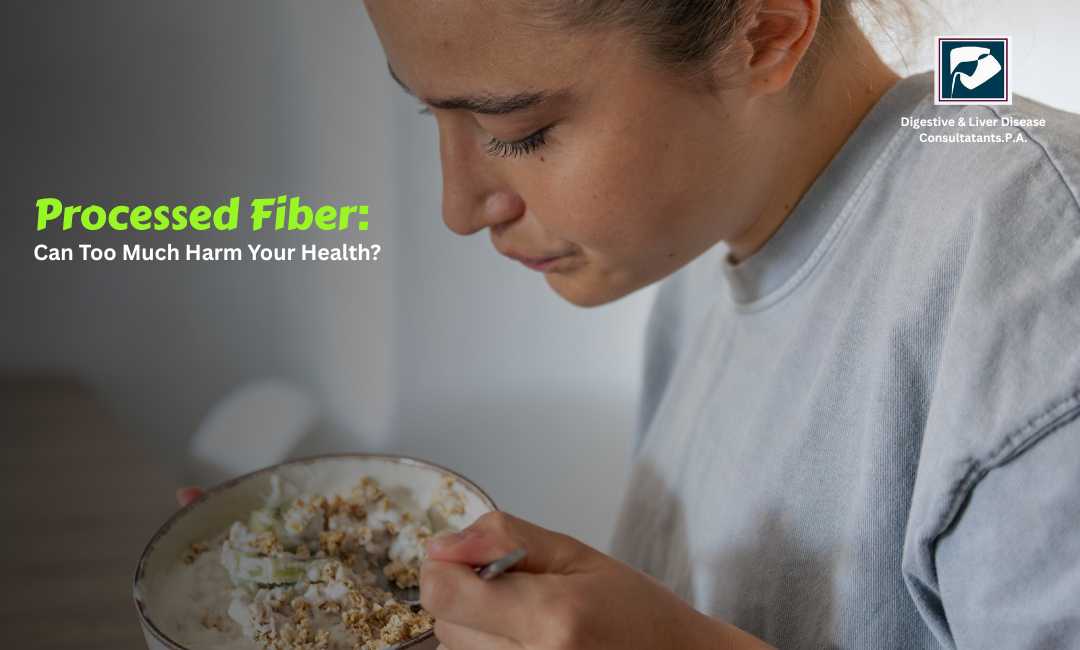When it comes to gut health, fiber is often celebrated as a hero. Doctors, nutritionists, and health experts all recommend eating enough fiber to keep digestion smooth, prevent constipation, lower cholesterol, and even reduce the risk of certain chronic diseases. But here’s an important question many people overlook: Can too much processed fiber actually harm your health?
The short answer is yes. While fiber is essential, not all types of fiber are created equal. Natural fiber from whole foods like fruits, vegetables, beans, and whole grains works differently in your body compared to processed fiber supplements and additives. Understanding this difference is key to protecting your digestive system and overall well-being.
In this blog, we’ll explore what processed fiber is, how it differs from natural sources, the potential risks of consuming too much, and how to find the right balance.
What is Processed Fiber?
Processed fiber, also called isolated or synthetic fiber, is fiber that has been extracted or manufactured and added to foods or sold as supplements. You’ll often find it in:
- Breakfast cereals labeled “high fiber”
- Snack bars and protein bars
- Meal replacement shakes and powders
- Fiber supplements like powders, gummies, or capsules
- Some common types of processed fibers include:
- Inulin (often from chicory root)
- Polydextrose
- Psyllium husk (though natural, it is often used in processed form)
- Cellulose
- Maltodextrin
Manufacturers add these fibers to boost the fiber content of processed foods, making them seem healthier. While they do provide some benefits, they don’t work exactly like fiber from whole foods.

Natural Fiber vs Processed Fiber
Natural fiber is found in plant-based foods and comes in two main forms:
Soluble fiber – dissolves in water and forms a gel-like substance, helping regulate blood sugar and cholesterol. Found in oats, apples, beans, and carrots.
Insoluble fiber – adds bulk to stool, helps food move through the digestive system, and prevents constipation. Found in whole grains, nuts, and vegetables.
Natural fiber comes with vitamins, minerals, antioxidants, and plant compounds that work together to support digestion. Processed fiber, however, is often isolated from its original source, meaning you miss out on those additional nutrients and benefits.
Can Too Much Processed Fiber Harm Your Health?
Fiber itself is not harmful. The issue arises when you rely heavily on processed fiber instead of natural foods or when you consume it in excess. Here are some potential problems:
1. Digestive Discomfort
Processed fiber, especially in large amounts, can cause bloating, gas, and stomach cramps. Inulin, for example, is known to trigger bloating in sensitive individuals.
2. Constipation or Diarrhea
Ironically, too much fiber—especially from supplements—can either make stools too hard or too loose. It depends on the type of fiber and how much water you drink.
3. Nutrient Absorption Issues
Some fibers can bind to minerals like calcium, iron, and zinc, reducing how well your body absorbs them. Over time, this could contribute to nutrient deficiencies if your diet is already lacking.
4. Masking Poor Diet Choices
Processed fiber in snack bars or shakes might make you think you’re eating healthy. But these foods may still be high in sugar, artificial ingredients, or unhealthy fats. Relying on them can keep you from eating the whole foods your body truly needs.
5. Worsening Digestive Disorders
People with conditions like Irritable Bowel Syndrome (IBS), Crohn’s disease, or ulcerative colitis may find processed fibers worsen their symptoms. Certain additives can be too harsh on an already sensitive digestive system.
How Much Fiber Do You Really Need?
The recommended daily fiber intake for adults is:
- 25 grams per day for women
- 38 grams per day for men
Most Americans get only about half of that. While fiber supplements can help fill the gap, it’s best to meet your needs through whole foods whenever possible.
If you do use supplements or processed fiber, do so carefully:
- Increase intake gradually to avoid digestive discomfort
- Drink plenty of water to help fiber move smoothly through your system
- Balance processed sources with natural foods
Smarter Ways to Get Fiber
Instead of depending heavily on processed options, focus on whole, fiber-rich foods such as:
- Fruits like apples, berries, and pears
- Vegetables like broccoli, carrots, and leafy greens
- Legumes including beans, lentils, and chickpeas
- Whole grains such as oats, brown rice, and quinoa
- Nuts and seeds like chia seeds, flaxseeds, and almonds
These foods not only provide fiber but also supply essential vitamins, minerals, and antioxidants that supplements can’t fully replace.
Finding the Right Balance
Processed fiber isn’t always bad—it can be helpful for people who struggle to meet their fiber needs through diet alone. Psyllium husk, for example, has proven benefits in lowering cholesterol and improving bowel regularity. However, balance is key.
Think of processed fiber as a backup option rather than your primary source. Whole foods should remain the foundation of your diet.
Why Digestive & Liver Disease Consultants, P.A. Emphasizes Gut Health
At Digestive & Liver Disease Consultants, P.A. (DLDC), we believe good digestive health starts with the right choices every day. Our team of board-certified gastroenterologists specializes in diagnosing and treating a wide range of digestive and liver conditions. We provide personalized care, from routine screenings and preventive advice to advanced treatments for complex conditions.
With years of experience and a patient-first approach, DLDC helps individuals make smarter nutrition decisions and manage conditions like IBS, Crohn’s disease, acid reflux, fatty liver disease, and more. If you are unsure about your fiber intake or struggle with ongoing digestive issues, our specialists can help you find a safe and effective plan.
Conclusion
Fiber is a cornerstone of good health, but too much processed fiber can sometimes do more harm than good. While supplements and fortified foods may have a place, whole foods remain the gold standard for supporting your digestive system. Striking the right balance will help you avoid discomfort, absorb nutrients effectively, and keep your gut functioning at its best.
If you suffer from bloating, constipation, diarrhea, or other digestive problems, don’t ignore the warning signs. The experts at Digestive & Liver Disease Consultants, P.A. are here to guide you toward better digestive health with personalized care and advanced treatments.
Call us today at 281-440-0101 or 281-453-2050 to schedule an appointment.






